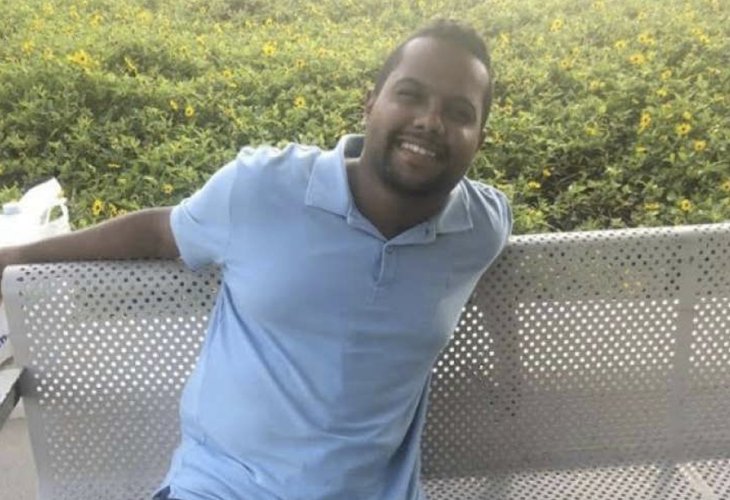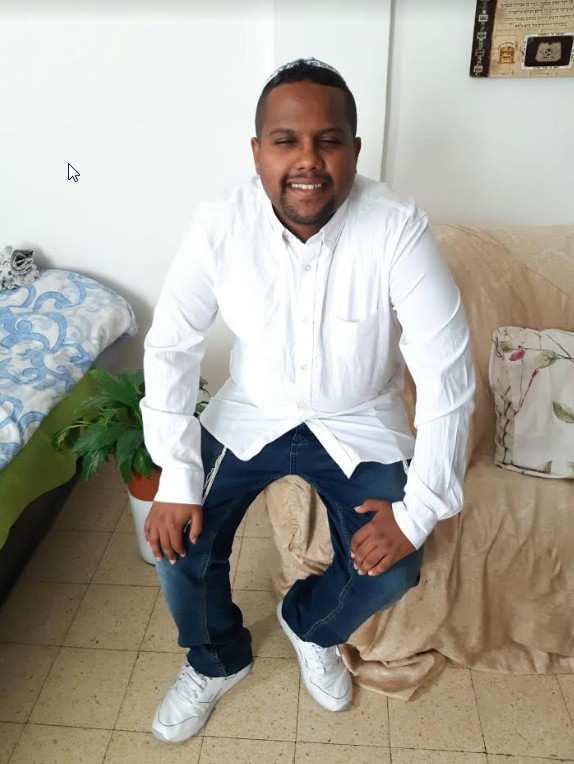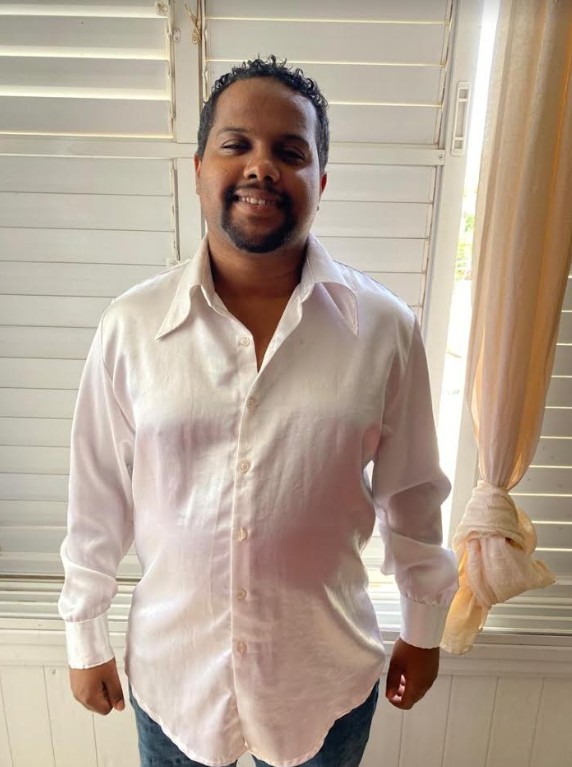The Singer with Visual Impairment: "Mom Waited Until I Was Older to Tell Me the Hard News"
Avihai Tahia, a young singer and creator, shares the story behind his song 'Not Losing Hope.' He talks about his family's return to faith inspired by him, an impromptu performance with Benaya Barabi that left no eye dry, and reveals why he shelved 600 songs he wrote. For the first time, he shares his feelings on the night he felt truly helpless.
 Avihai Tahia
Avihai TahiaPleased to Meet You
"Avihai Tahia, 25, single, living in Petah Tikva, singer and musician".
Gossip Doesn’t Affect Me
"I was born in Israel and grew up in Petah Tikva with my mom and sister. My mom and her whole family were born in Ethiopia. Their journey to Israel was very difficult and complex. I have a visual impairment, and at a certain point, some of my friends found out about it. Because of this, my childhood wasn't simple. I also sang from a young age, and for these reasons, many kids didn't support me. They often gossiped about me and sometimes spoke to me harshly. I tried hard to ignore it, but it wasn’t always easy. Over the years, I became more resilient, and at some point, I no longer counted them. I just followed my truth.
"In my childhood, we were a secular family, but *Baruch Hashem* we returned to faith. When I was eight, I once went to the synagogue, heard the cantor sing, and it really moved me. I've been connected to music from a very young age, and instantly felt a strong connection to melodies and prayers. I made contact with a neighborhood rabbi, learned *piyyutim* and *maqamim*, and over time, got more involved. As the years passed, I learned more about the commandments and began to strengthen myself with more and more spiritual resolutions.
"My mom and sister saw what was happening to me, saw that I was learning and doing good things, and it inspired them to observe the commandments. When I went up to read from the Torah at my Bar Mitzvah, my rabbi told me I had to do something with my music. And alongside, I continued to grow stronger in faith. I realized that going out with friends and those things aren’t important, that there is a Creator of the world, and we must do as He says. That is the purpose of life."
My Eyes
"I suffer from an eye disease that severely affects my vision. The disease is hereditary, but surprisingly, I don't know of anyone else in my family who has it. In the light, I see about 60%, in the dark less than 10%. That means I can hardly see at all. My mom knew about the disease from an early age but didn't tell me. Until fourth grade, I didn't notice it. During the year, one of the teachers asked me to sit closer to the board so I could see better. I didn’t understand what she was talking about, but when I got closer, I really saw better. When I returned home, I told my mom what happened, and she told me I have an eye disease. My mom waited with the news as long as she could. She wanted me to be as mature as possible when I became aware of the disease. After mom told me about the disease, I knew I had something, but I never felt it. I always saw fine.
"This is the first time I'm telling this story, I've kept it to myself until now, but one night, when I was 16, I first realized the severity of the problem I suffer from. It was the first time the eye disease interfered with me. Until that night, everything was fine. I was walking in my neighborhood, and suddenly I felt I couldn't walk alone. I couldn’t see the path. I didn’t know how I would get home.
"This feeling made me very sad. It was the first time I felt helpless. I tried to continue walking home, but time passed, and I realized I was just getting more and more lost, like a maze with no exit. I didn’t have a phone, didn’t know what to do, and suddenly, in divine providence, my uncle saw me. He said 'hello', and asked what I was doing near his house. I told him what happened and asked him to take me home. Beyond the difficult feelings, it was also very strange for me that it happened so suddenly. I went to the eye doctor, wanted to understand what happened, and he explained to me that my vision was deteriorating over the years, and that in the period around that night, there was a significant deterioration. That's why what happened, happened.
"Thank God, I'm an optimistic person, so I don't see the visual impairment as an obstacle but as something to grow from and with its help. Something to overcome, to progress even though it's present. When I understood the severity of the problem, I was very sad, but at the same time, I told myself and others that the Creator of the World gave, and the Creator of the World can also take away.
"Bottom line, I see my eye disease as a gift. For example, you can also see bad things, and *Baruch Hashem*, I almost can't see them. Practically speaking, I walk with a cane and do everything alone. And if I need help from time to time, then *Baruch Hashem* I have someone to rely on - family and friends. I study in Tel Aviv, in a place called 'Migalor'. Visually impaired people study there and constantly progress. We acquire life skills there that make us as independent as possible. No one likes to be in need of help and pity."

How Does He Sing
"From a very young age, I sang to family and friends. Many times, people who heard me sing were enthusiastic about my voice, and it gave me the strength to continue. Regarding friends, some supported me and some didn't. Those who supported encouraged me, and those who didn't said I wouldn't get far. At first, I didn't handle it well. Over time, I realized I had to work on myself. Not to listen to bad criticisms, and to focus on the good.
"I prayed a lot to Hashem, asking Him to help me succeed in this matter. Music is very important to me, but if I see that I can't make a living from it, I'll go into tech. I also really like the field of computers."
The Shelved Songs
"One of the reasons I'm involved in music is that the visual impairment doesn't interfere that much in this field. Besides that, I'm also very connected to music, so during my life, I wanted to see 'if I have it'. At first, I thought I don't sing well, but then friends told me to do something with it. I wanted to wait a bit, to mature, and today I definitely want to succeed in this field. I believe I can be on the biggest stages, despite the visual impairment. I want to hold my performances, at the Zappa for example. To perform with musicians in front of a live audience.
"Beyond that, I also write and compose. I have written about 600 songs so far. I shelved all of them, and released only two, the best two. Additionally, from age 13 to 22, I learned to play the guitar. In recent years, I've focused more on singing, on developing a musical ear, on how to stand on stages. Sometimes people don't understand how I play the guitar despite the visual impairment, but the answer is that I rely heavily on the sense of touch. At first, it wasn't easy at all, but I practiced a lot and over time became more successful."
Not Losing Hope
"Most of the songs I've published so far are covers. Cover versions of other people’s songs. I already have 11 such covers, some were more successful, some less. One of the covers I am most connected to is 'We'll Wait for You' by Ishay Ribo and Natan Goshen. I am very connected to its chorus: 'In a tired body of failures, in a heart broken into pieces, we'll wait for you to receive us.' It strengthens me a lot. I want to see the salvation of Hashem with my own eyes.
"Another song I am very connected to is 'Not Losing Hope', written by my PR manager, Arlette Spada. The song talks about the difficulties people face and how one must never lose hope. I have participated in several competitions in the past, one of which was 'The Next Voice' aired on the Hidabroot channel. Not once during the program did I receive harsh criticism from the judges, but overall the program built me up a lot. The judges in the program were known artists, including Itzik Dadya and Adi Ran, and it wasn't always easy to hear them. But as I said, you have to learn from everything, and you must never lose hope. I can't elaborate much about this right now, but there’s another competition I took part in. It will be a big surprise. *Baruch Hashem*, I had the privilege to sanctify Heaven’s name in this program."

Tefillin Between Your Eyes
"The faith in the Creator of the World and the observance of the commandments are like oxygen to me. Without strong faith in Hashem, I don't know how I would have dealt with the visual impairment. With the help of faith and performing the commandments, I also constantly advance, and more and more believe in myself. For example, for several years I couldn't put on *tefillin* by myself, so over several months, I practiced it and now I succeed. When I couldn't put on *tefillin* alone, it saddened me greatly. I prayed to Hashem with all my heart that I could do it. I didn't want to depend on friends and family. I had my mom help me, put on *tefillin* with her, again and again, and again, and after five months, I succeeded. It was very, very difficult, but in the end, it was worth it."
Someone Is With Me Here
"It's very important to me to invest in music, so at a certain point I decided to study at Rimon. I went to an open day they held and saw Benaya Barabi performing there on one of the stages. Benaya studied at Rimon, so they asked him to perform on the open day. After a few songs, he asked if anyone from the audience wanted to sing with him 'Someone is With Me Here', and I said I wanted to. He saw me and said, 'Come on, darling, come sing with me.' It was very powerful for me, a sign from God, because I prayed to Hashem that I would sing with someone I admire and love on the open day at Rimon. I also read *Tehillim* for it to happen, and here it happened. It moved me how everything is directed from Hashem.
"Anyone who was there noticed my visual impairment, and during the performance, I saw the crowd was very touched. Quite a few also shed a tear. After I went down, the manager of 'Rimon' came to me and said I moved him a lot. In the auditions, I passed the first stage, also the singing and guitar test, but when I went to the second stage, I had an ear infection so I didn't hear well, and they tested musical hearing, in which I failed. Today it is clear to me that it was for the best."

